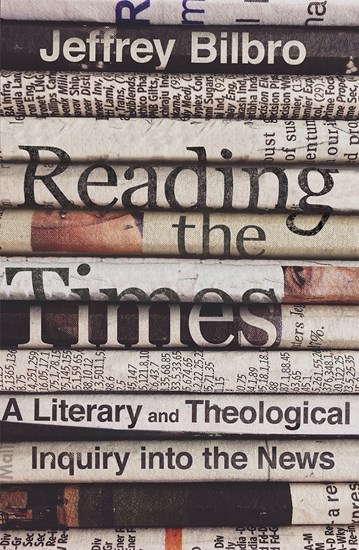
Reading the Times
"Reading the morning newspaper is the realist's morning prayer."—G. W. F. Hegel
Whenever we reach for our phones or scan a newspaper to get "caught up," we are being not merely informed but also formed. News consumption can shape our sense of belonging, how we judge the value of our lives, and even how our brains function. Christians mustn't let the news replace prayer as Hegel envisioned, but neither should we simply discard the daily feed. We need a better understanding of what the news is for and how to read it well.
Jeffrey Bilbro invites readers to take a step back and gain some theological and historical perspective on the nature and very purpose of news. In Reading the Times he reflects on how we pay attention, how we discern the nature of time and history, and how we form communities through what we read and discuss. Drawing on writers from Thoreau and Dante to Merton and Berry, along with activist-journalists such as Frederick Douglass and Dorothy Day, Bilbro offers an alternative vision of the rhythms of life, one in which we understand our times in light of what is timeless. Throughout, he suggests practices to counteract common maladies tied to media consumption in order to cultivate healthier ways of reading and being.
When the news sets itself up as the light of the world, it usurps the role of the living Word. But when it helps us attend together to the work of Christ—down through history and within our daily contexts—it can play a vital part in enabling us to love our neighbors. Reading the Times is a refreshing and humane call to put the news in its place.
"There may not be any greater need in this moment—for both the church and the larger culture—than a practical theology of the news. Reading the Times is a book that addresses a discipleship crisis of our day. It may be a generation too late, but it's not a moment too soon."
"I am so grateful for a book that steps back from the flash and distraction of headlines to think deeply about the purpose of the news and how Christians are called to engage. In Reading the Times, Jeffrey Bilbro provides readers with a theological framework for our contemporary discourse. He offers examples from the tradition, from the Old Testament to modern heroes of the faith, such as Frederick Douglass and Dorothy Day, that we might apprentice ourselves, as Bilbro puts it, before these models. Like a teacher, Bilbro questions readers about our ways of responding to media, and he leads us to consider how our participation with contemporary news forms us and our community. By contextualizing our reading of the news within kairos, Bilbro shows Christians how, as T. S. Eliot writes, 'to apprehend the point of intersection of the timeless with time.' A relevant and timeless book about how Christians should belong in but not of this world."
"Jeffrey Bilbro's Reading the Times makes a compelling sweep of material, technological, and philosophical history, helping Christians ask pressing contemporary questions: How do we attend faithfully to the news? To what political, moral, social, and spiritual ends do we scroll Twitter, check Facebook, and scan the morning headlines? Attention deficit, hyperpartisanship, and misinformation are familiar problems in our current media landscape, but Bilbro goes beyond these standard diagnoses. In the Augustinian tradition, he examines not just media consumption but media appetite. I find his work both practical and prophetic: one foot in chronos, one in kairos, Bilbro begs us to fight for better media habits and rightly ordered media loves. I hope people will gather together around these pages and attend to them slowly, prayerfully, resolutely."